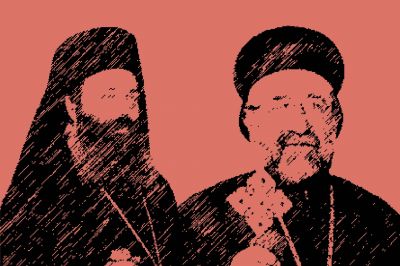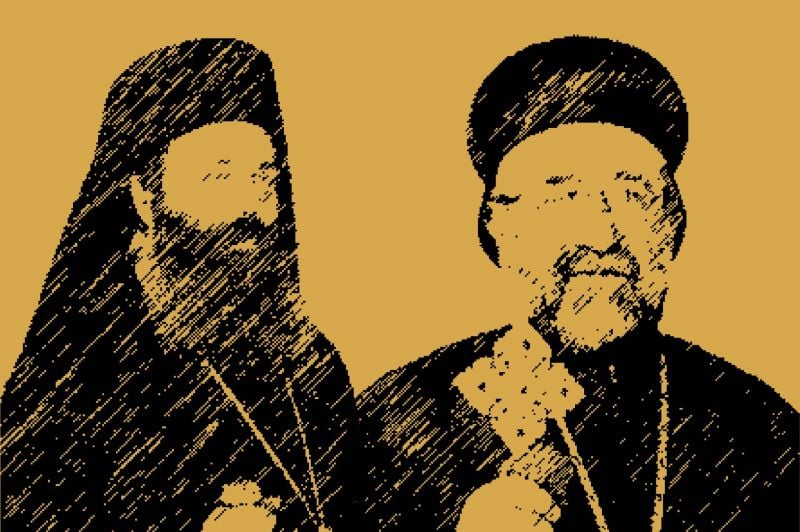
Greek Orthodox Archbishop of Aleppo Boulos Yazigi and Syriac Orthodox Archbishop Youhanna Ibrahim. (Credit: Jaimee Haddad)
In early April 2013, Syriac Orthodox Archbishop of Aleppo Youhanna Ibrahim made contact for the first time with the Head of the Lebanese General Security (GS) Abbas Ibrahim via an intermediary.
The two men had little in common other than their last names. The former is a man of faith and a recognized intellectual in the region, rumored to be the next patriarch of the Syriac Orthodox Church. The latter is a military man turned indispensable negotiator in security and diplomatic affairs and rumored to be poised for a prominent political role.
However, since the outbreak of the Syrian civil war two years earlier, they shared another commonality. The high religious dignitary had taken on the role of discreet mediator in certain abduction cases, particularly of Christians, in the Aleppo province. Meanwhile, the conflict had spilled over into Syria's neighboring country, Lebanon, and the powerful general had been working for nearly a year to secure the release of nine Shiite nationals captured by a rebel group in May 2012 in the same region while returning from a pilgrimage in Iran. "Archbishop Ibrahim offered me his help," the former head of GS recounted to L'Orient Today in May 2023, sinking into his chair. "Unfortunately, I didn't have the chance to respond to him because, a week later, he was the one who got kidnapped."
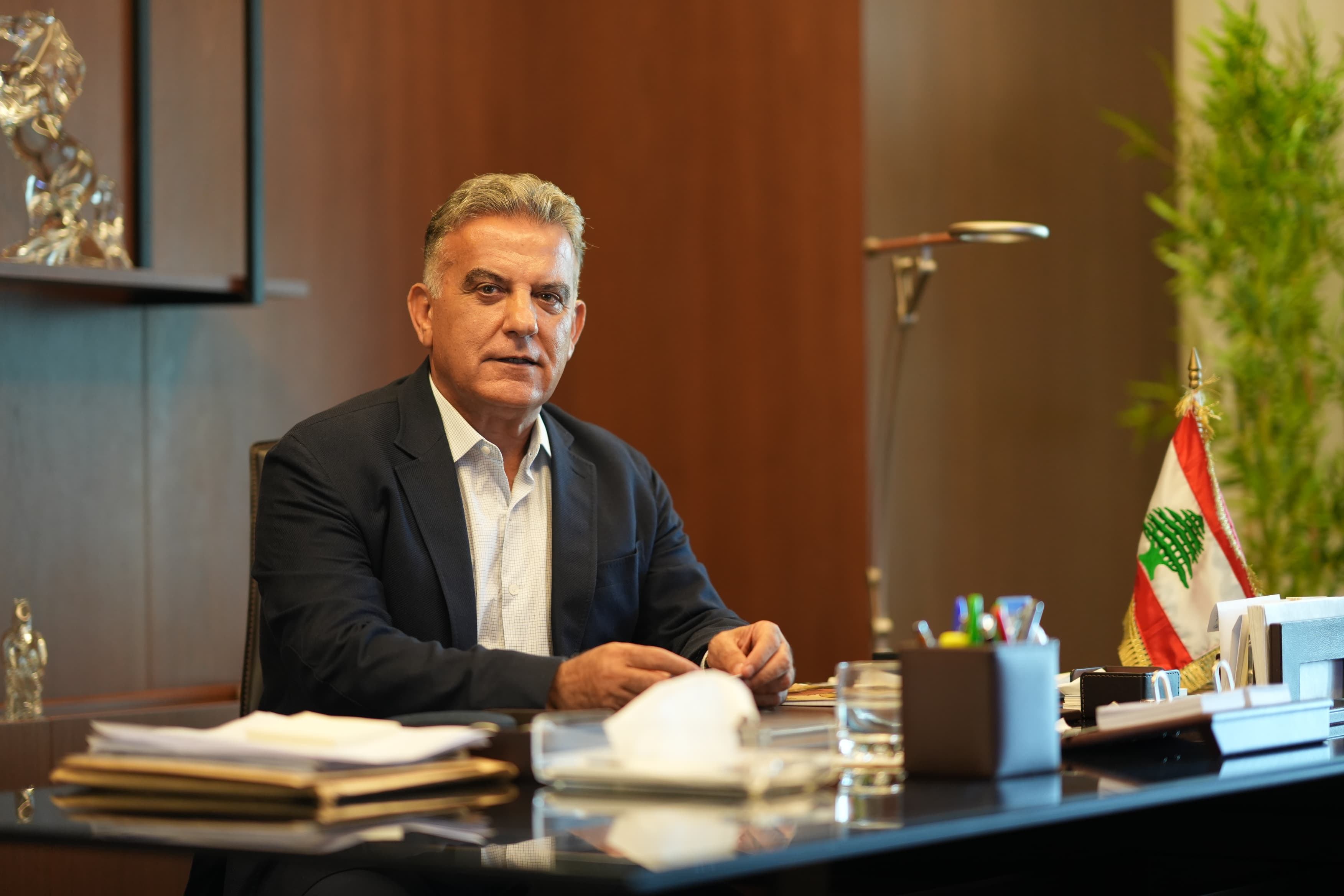 The former head of General Security in his office, July 2023. Mohammad Yassine
The former head of General Security in his office, July 2023. Mohammad Yassine
Since leaving his post at the helm of GS in March 2023, Abbas Ibrahim has been receiving visitors on the third floor of an upscale building, under high surveillance, in the southern suburbs. "I don't have all my files at hand yet, I've just moved in, but you can look at these," he said, handing over two files, each containing a few pages which he retrieves from a cupboard. They detail the kidnapping of the two archbishops of Aleppo on April 22, 2013. "This story is a bit like that of Imam Moussa Sadr. Will we ever know the truth about what happened? I don't know," he said.
Having held one of the highest security and strategic positions in the country for twelve years and having been entrusted with the most sensitive missions, did he just confess powerlessness concerning this particular case? When he was tasked by the Eastern Churches, Abbas Ibrahim first contacted the Syrian authorities to obtain information related to the circumstances of the abduction. During our meeting, he handed over a frail dossier resembling more a compilation of administrative documents than an investigation, allowing us only to look at it on-site. The circumstances of the abduction are written in Arabic, and official requests for assistance from the Turkish and Qatari authorities are annexed. These two countries were providing financial and logistical support to armed rebel groups opposed to Assad, and therefore might have crucial information about the fate of the archbishops. But from Ankara to Doha and from Damascus to Moscow, where he visited multiple times, the response was the same: "We know nothing about it," he said, emphasizing each word.
Chechen Trail
In the early press articles that appeared, it was vaguely mentioned that the two religious leaders were kidnapped while on a "humanitarian mission." Archbishop Ibrahim, the initiator of the expedition, was then one of the few, if not the only one, to serve as a mediator between the two sides in the region, where prisoner exchanges were sometimes negotiated, according to the sole survivor of the abduction, Fouad Eliaa. Archbishop Boulos Yazigi, a fine scholar, and author of numerous books, had never taken on this negotiator role, and his presence during the expedition was coincidental. "Had they become cumbersome for the parties occupying the area? Only God knows, but we want to know, " pondered former Aley deputy (co-founder of the Lebanese Democratic Party, Arslane, pro-Syrian) Marwan Abou Fadel, head of the Orthodox Liqaa Party. He doesn't know who to blame.  Commemoration of the disappearance of the archbishops at the Sofitel hotel in Beirut, at the initiative of the Orthodox Meeting. Caroline Hayek
Commemoration of the disappearance of the archbishops at the Sofitel hotel in Beirut, at the initiative of the Orthodox Meeting. Caroline Hayek
At the time of their disappearance, for both the Syrian authorities, the Churches and their representatives, the culprit was already designated: It could only be the opposition seeking to destabilize the Christian communities by targeting two of its most prominent members. The origin of the four mercenaries behind the attack points in that direction. According to Fouad Eliaa's testimony, they were Chechens. The Syrian Ministry of Waqf, responsible for Religious Affairs, promptly mentioned this in a statement the day after the abduction, asserting that there was evidence that the kidnappers were "Chechen mercenaries operating under the auspices of al-Nusra (the Syrian branch of al-Qaeda)." This was based on the interrogation of the sole witness to the abduction, specifying that he wished to remain anonymous. "According to this person, the kidnappers spoke classical Arabic and looked like foreigners. They told him they were Chechen jihadists," Damascus authorities said.
However, the witness in question, who was none other than Fouad Eliaa, claimed to L'Orient Today that he had never spoken to the authorities in the days following the abduction. He even denied their version of events: "They didn't speak at all, but they made themselves understood through gestures," he maintained.
"These are Russian security infiltrations"
As early as 2011, hundreds of jihadists from Chechnya and the neighboring republic, Dagestan, had flown to 'Bilad al-Sham,' covertly encouraged by Moscow, delighted to see them fight far from home. It was in the Aleppo region that they reappeared in late 2012 and fought alongside local factions before later joining radical movements like al-Nusra or the so-called Islamic State. In early 2013, a Russo-Chechen brigade operating in the Aleppo region was accused by the rebel group 'Liwa al-Islam' (later renamed 'Jaysh al-Islam') of seizing villages by force and instilling terror. "Who introduced some Caucasians into the areas of the Syrian opposition? These are Russian security infiltrations," accused George Sabra, president of the National Coalition for Syrian Revolutionary and Opposition Forces.
"These men are suspected of being manipulated by Russian intelligence personnel and of committing the abuses they are accused of, including the kidnapping on April 22 of two bishops of Aleppo," wrote former French diplomat Wladimir Glasman, in his blog 'Un œil sur la Syrie,' (an eye on Syria) six days after the incident. The aim? "To contribute to discrediting the entire revolution and stoking interfaith violence, which the current regime continues to see as one of its possible lifelines."
The Syrian regime and its affiliates accuse Nour al-Dine el-Zinki, a group close to the Muslim Brotherhood and supported at the time by Turkey, Qatar, Saudi Arabia and the United States, of being the real masterminds behind the kidnapping.
Within the command structure of the armed rebellion, especially among the ranks of the Free Syrian Army (FSA), which includes about ten factions including Zinki, a crisis cell is established. "All we knew was that the kidnappers were mercenaries who disappeared as quickly as they appeared. We contacted each opposition group one by one, but it yielded nothing," recalled a former representative of the FSA, speaking anonymously. "In case of kidnappings by opposition groups, information circulated. There was always access, even among jihadist groups like al-Nusra or Ahrar al-Cham," observed political analyst Ziad Majed.
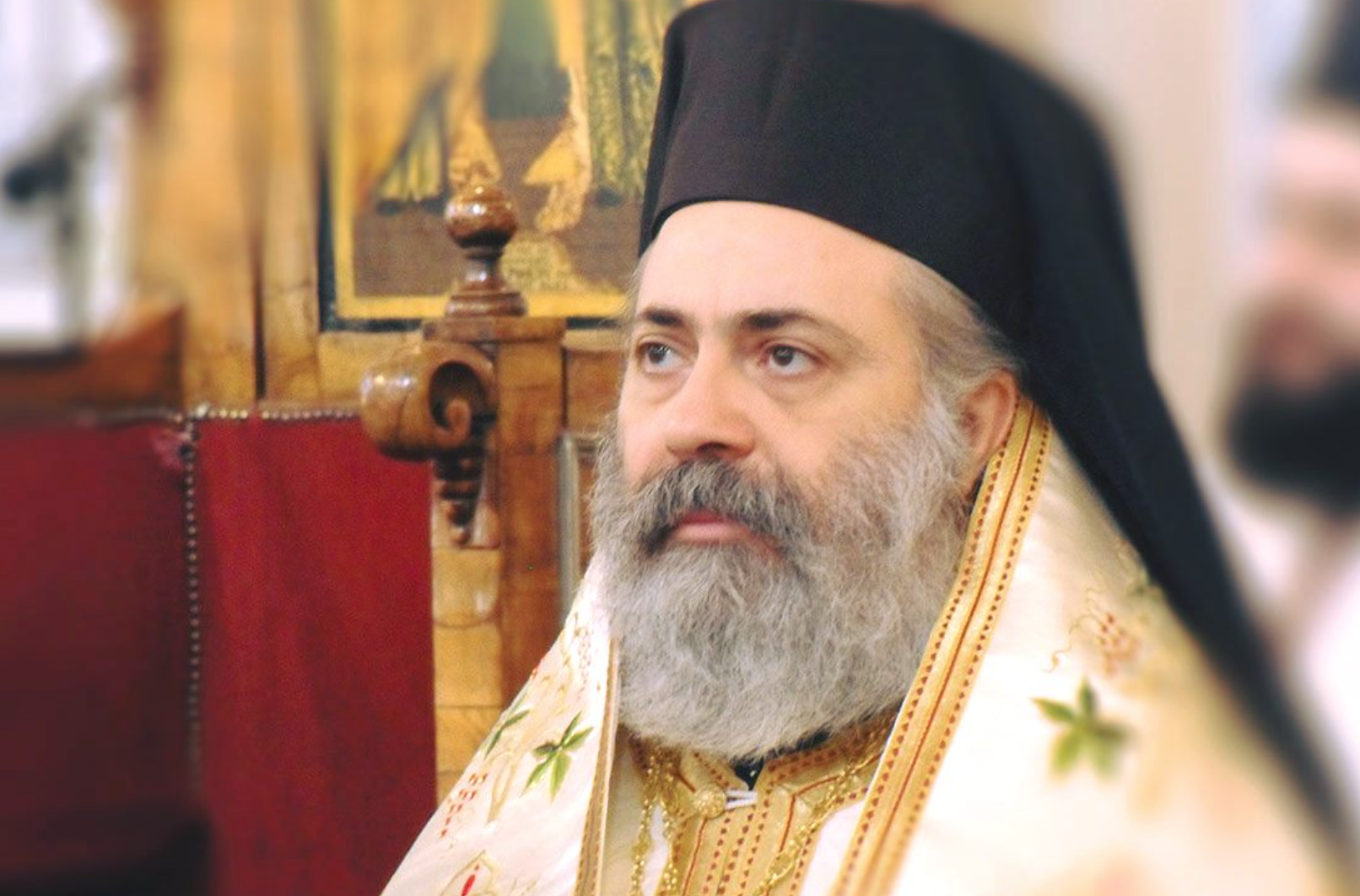 Greek Orthodox Archbishop of Aleppo Boulos Yazigi. Eponymous Facebook group photo
Greek Orthodox Archbishop of Aleppo Boulos Yazigi. Eponymous Facebook group photo
Behind the diplomatic scenes, efforts were also underway. In Doha, emissaries came and went. In October 2013, facing the Maronite patriarch of Antioch and all the East, Patriarch Bechara al-Rai, Emir Tamim bin Hamad al-Thani promised to "throw all his weight into the balance to determine the fate of the archbishops and obtain their release."
"This incident could only discredit our cause, so it was absolutely necessary to find the perpetrators. Enormous sums, tens of millions of dollars, were offered by the Qataris in exchange for their release, but we didn't know who to address and no one came forward," continued the former FSA representative. Six months later, hopes are still alive. After a visit to the Greek Orthodox patriarch, Lebanese Deputy Prime Minister Samir Mokbel assured that the two bishops "are in good health and a safe place." In the early years, such developments occasionally arose: Hearsay, rumors, but nothing tangible. No proof of life ever reached the families. These murky circumstances sow doubt among the ranks of the Syrian opposition. "No one ever came forward to 'benefit' politically from this abduction. However, if they were indeed held by an opposition group, there would have been backstage clues or ransom demands," suggested George Sabra.
'Erdogan behind the murder'
Interrogated by the official Argentine news agency Telam in May 2013, Syrian President Bashar al-Assad claims to have information about the presence of the two prelates on the Syrian-Turkish border. He said he closely followed the issue to free them from the hands of "terrorists." This would be the only time he publicly mentioned the issue. State television occasionally reported on elements of the ongoing investigation. "And then, they announce that it is Erdogan himself who ordered their murder," recounted Ayman Abdelnour, former advisor to Bashar al-Assad (until 2004) and president of the opposition NGO 'Syrian Christians for Peace,' not without irony. The Turkish track would be favored by the Syrian authorities due to Turkey's links with the rebellion. And since no clues come from Syrian territory, the archbishops may have been taken to Turkey. Religious media, relaying a Russian NGO, circulated this hypothesis based on information coming from the Syrian regime, the Republic's Mufti, Ahmad Badreddine Hassoun. The motive mentioned by the latter? Ankara would want to transfer the seat of the Orthodox Patriarchate of Antioch, located in Damascus, to Turkey.
"Contact with Turkish authorities was constant," Abbas Ibrahim asserted during our interview in 2023. In October 2013, he had traveled there when a supposed agreement for their release seemed close to materializing at the same time as that of the Shiite Lebanese pilgrims. "A false lead," he confessed. "Many ordinary people in Turkey offered us exchanges, images, or proof of life for money. It was all hot air," the general recounted. "The Turks assured us they had nothing to do with it. No serious information has come from that side," added an important Lebanese emissary, speaking anonymously.
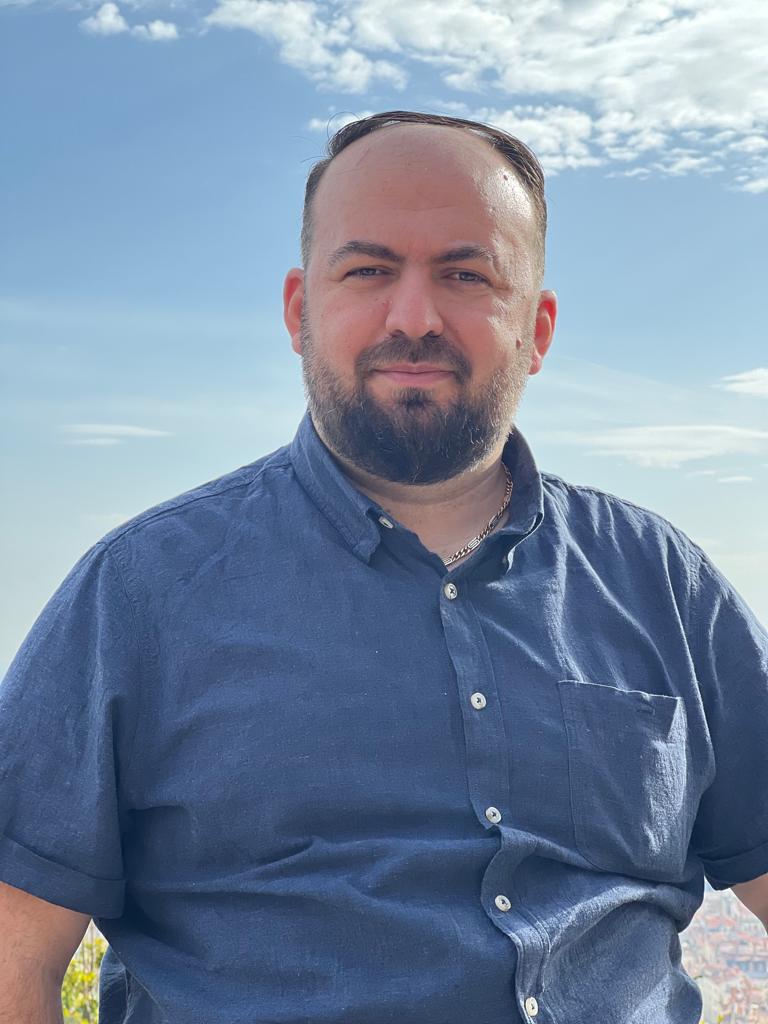 Jamil Diarbakerli, executive director of the Assyrian Observatory for Human Rights and nephew of Archbishop Youhanna Ibrahim. Photo JD
Jamil Diarbakerli, executive director of the Assyrian Observatory for Human Rights and nephew of Archbishop Youhanna Ibrahim. Photo JD
In 2014, the Turkish Ministry of Foreign Affairs definitively denied Syrian accusations in a statement and assured that it is deploying efforts to secure their release. "It is evident that these allegations are put forward by certain circles to put Turkey in a difficult situation and to serve their own objectives," the statement related. "Even if we must not rule out any actors, I don't see what Turkey's aim would be in this matter," opined Jamil Diarbakerli, executive director of the Assyrian Monitor for Human Rights (an NGO based in Sweden) and nephew of Archbishop Ibrahim.
Notable absentees?
While the whole world seems to be searching for them, one country is missing: The United States. They did not join the flood of vigorous condemnations from the Vatican and Arab and Western heads of state. "In the past, we've seen the American government hesitate to speak too assertively about the persecution of Christians, lest they be seen as a vanguard of a kind of Christian imperialism," explained Thomas Farr, a former director of the Office of International Religious Freedom at the State Department, interviewed on April 24, 2013, by the Catholic News Agency. A month later, seventy-two members of the US Congress urged the State Department to rectify the situation and "to make the immediate release and safe return of Metropolitans Yazigi and Ibrahim a priority in [their] efforts in the region." But the US administration remained quite shy. At that time, Washington's priority was elsewhere. It was to militarily support the FSA, after obtaining evidence of the regime's use of chemical weapons.
This silence was all the more incomprehensible given that Archbishop Youhanna Ibrahim holds American citizenship. "They did not take it seriously. Was it because he was a dual citizen?" questioned his nephew Jamil Diarbakerli. "Anyway, the fate of Christians in the region does not matter to them," he added.
"We will no longer remain silent"
Eleven years later, this policy has not changed, or very little. The US State Department, through its spokesperson Noel Clay, indicated to L'Orient Today in May 2023, that they had "nothing to say on the subject." After several access requests and four months of waiting, our outlet nonetheless obtained, from US authorities, declassified documents exclusively under the Freedom of Information Act. In the 69-page dossier are newspaper articles, correspondences between officials on the subject, briefings on the situation in Syria, and requests for help from Christian associations, religious figures, or civilians.
But there was a particular note that catches the attention. In April 2017, a petition launched by the International Christian Union, an NGO based in the United States, urged the country to provide answers about their disappearance, and mentioned twice the American citizenship of Youhanna Ibrahim. "It has now been four years that we have been investigating behind the scenes. We will no longer remain silent. In accordance with the Freedom of Information Act and the fact that one of these men is an American citizen, we now demand from the United States government in particular and from the international community in general that they provide us with answers about where they are," the original text stated.
In one of the email exchanges between officials at the State Department dating from April 2018, one of them wrote: "With this online petition, we could be asked questions. We have closely guarded (secret) his American citizenship." He then indicated that the HRFC (Fusion Cell for Hostage Recovery) will schedule a call with the nephew. "No one in the US government called me at that time, or at any other time," assured Jamil Diarbakerli. According to the documents, the FBI asked an individual, whose name was redacted, to contact the parishioner behind the petition to ask him to remove the mention of citizenship. The latter refused. The version now online has, in any case, been stripped of this "embarrassing" element. “I received several calls, from the Syriac Orthodox archdiocese, then from a family member, who asked me to remove it for security reasons, so we did it,” explained Joseph Hakim, president of the International Christian Union.
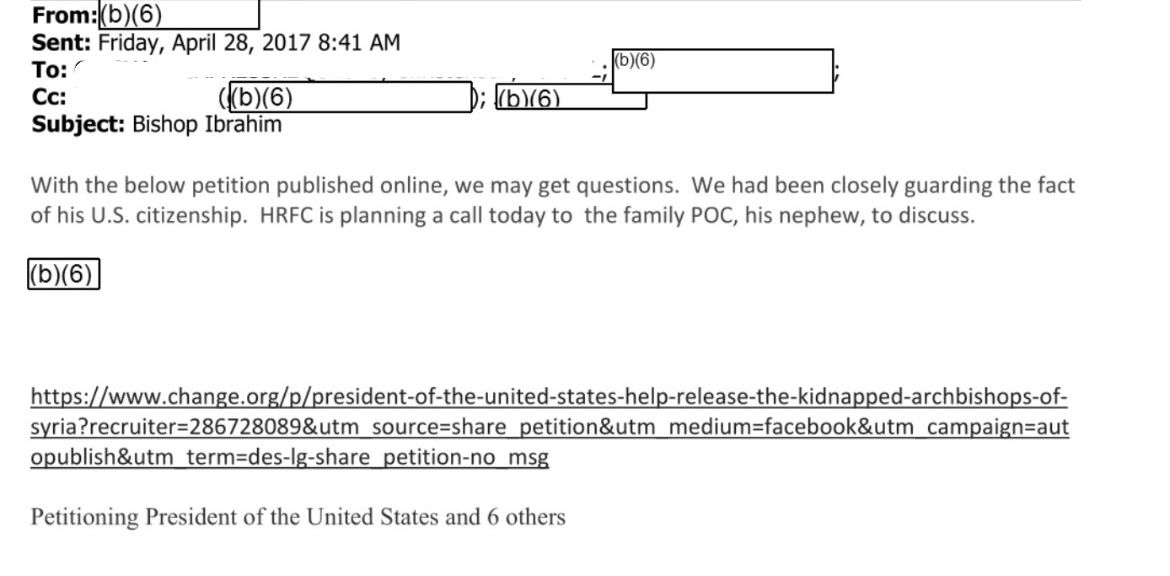 Declassified document from the US State Department obtained by “L’OLJ”, in August 2023.
Declassified document from the US State Department obtained by “L’OLJ”, in August 2023.
 Declassified document from the US State Department obtained by “L’OLJ”, in August 2023.
Declassified document from the US State Department obtained by “L’OLJ”, in August 2023.
Why did the United States deliberately conceal the fact that one of their citizens had been abducted? Knox Thames, now a university professor, is "familiar with these two tragic cases" and was pleased that we want to "highlight their plight." In 2015, he was appointed Special Advisor for Religious Minorities in the Near East and South/Central Asia at the US Department of State. He's the only one who agreed to answer our questions. However, once received via email, the discomfort was palpable. "If it was widely known they had American citizenship, it would likely place them in even more serious danger. I don't know for certain if that's the logic, but that would be a wise decision by those working to see them returned," he wrote.
Yet, the abductions in Syria of two American nationals, Austin Tice in August 2012 and Kayla Mueller in August 2013, were publicly acknowledged by the US government. "Their priority is the release of Tice, who is held by the Syrian regime. The Americans are negotiating directly with Damascus," confided an Arab diplomat, speaking anonymously. Did the Americans realize early enough that they would get nothing on Youhanna Ibrahim?
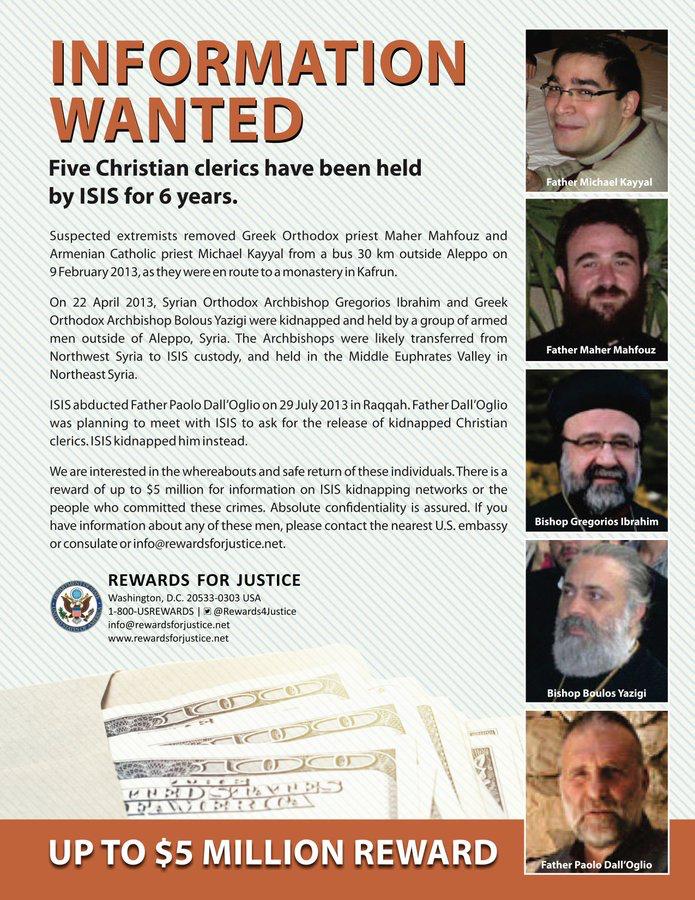 Reward offer for information regarding five clerics “held by the Islamic State.”
Reward offer for information regarding five clerics “held by the Islamic State.”
In July 2019, the Reward for Justice program announced a reward of $5 million for any information on the kidnapping of two priests, Michael Kayyal and Maher Mahfouz, Archbishop Youhanna Ibrahim and Boulos Yazigi, and Father Paolo Dall'Oglio. Curiously, these kidnappings are all attributed to the so-called Islamic State. While the Italian Jesuit priest was indeed abducted by ISIS in July 2013 in Raqqa, this hypothesis is also valid in the eyes of US diplomacy regarding the Syrian clerics. The former is said to have been abducted by "extremists presumed to be from ISIS," while the latter may have been kidnapped "by individuals aligned with Jabhat al-Nusra, the Syrian branch of al-Qaeda," but were "later transferred to ISIS." None of those interviewed in this investigation, witnesses, diplomats, opponents, military personnel, or even regime insiders, ever mentioned ISIS as a potential sponsor of the abduction. It must be said that at the time of the events, ISIS was still in its infancy in Syrian territory and did not exert its full weight in the Aleppo province, where the abduction took place.
Muddying the waters
In January 2020, nearly seven years after their disappearance, a lengthy article presented as an "investigation", riddled with inconsistencies, was published in English on the website, Medium, signed by a "Syrian researcher based in the United States" named Mansur Salib. According to his hypothesis, the abduction of the bishops, and before them of two priests, were organized by Georges Sabra with the help of Turkish intelligence services, all under the auspices of "the United States," to "destabilize the situation in the country." "Their martyrdom was predetermined long before the abduction when the head of the Syrian opposition met with representatives of American and Turkish intelligence agencies."
"Fake news" is born
To do this, according to Salib's hypothesis, Ibrahim and Yazigi could have been kidnapped and then killed in December 2016 by Islamists from Nour al-Din al-Zenki, an Islamist rebel group, willing to convert them to Islam. The only witness cited in this "investigation" is a certain Yasser Mehdi, presented as one of the bishops' jailers, who was subsequently arrested by the Syrian army. "I was contacted by 'email' and I answered the questions as I do every time journalists contact me. But when the text came out, I found it very suspicious. My answers were manipulated to serve a theory, which fits perfectly with the Syrian authorities' version and which I do not subscribe to," summarized Jamil Diarbakerli. In November 2019, he was contacted, in English, by a certain Klaus Ulbricht who introduced himself as a journalist without specifying his affiliation or the media he worked for. The problem? No journalist by that name exists. According to our research, the email address used for the interview seems to have been created on Gmail only for this purpose and has been little used since. The article is posted on the Medium platform, a site that allows anyone to publish their writings. The pseudonym of the author, "Mansur Salib," presenting himself as a "Syrian researcher in the United States," was used to give more credibility and weight to the publication.
Here, "fake news" was born. It now needs to spread. And what better way to do that than at the highest level of Christianity, The Vatican? Relayed, unquestioningly, by Fides agency, the news agency of the Holy See, it will be the subject of attention for media or associations close to the far right, supportive of Bashar al-Assad. But, several Lebanese media outlets will also be fooled. The Eastern Churches, however, would not comment on the matter.
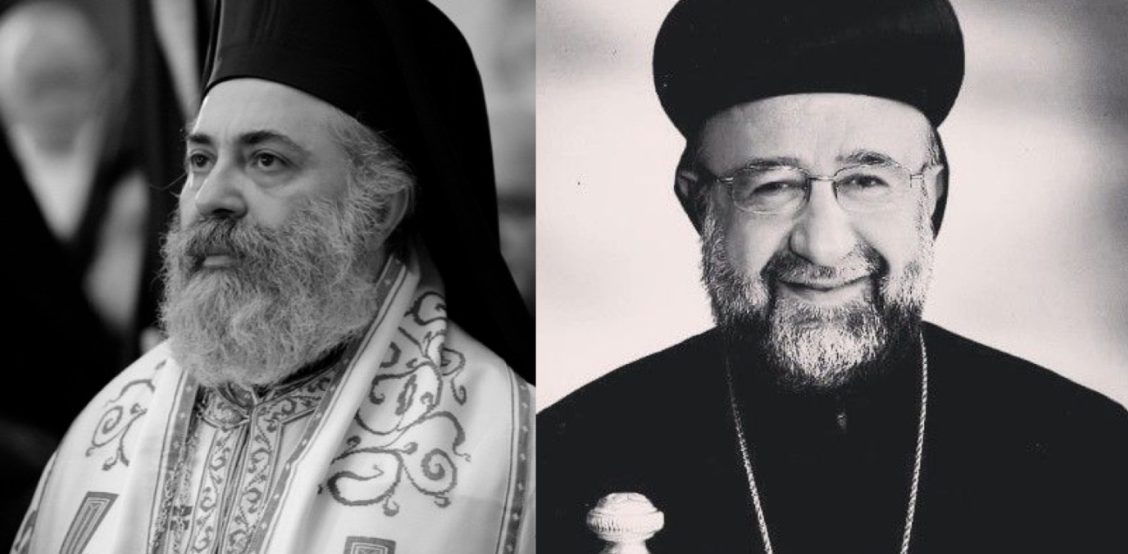 Greek Orthodox Archbishop Boulos Yazigi and Syriac Catholic Archbishop Youhanna Ibrahim.
Greek Orthodox Archbishop Boulos Yazigi and Syriac Catholic Archbishop Youhanna Ibrahim.
This is not the first time that the propaganda machine had been set in motion. "Since day one, there have been parties in Lebanon affiliated with the Syrian regime, the 'moumanaa,' spreading contradictory information so that people look elsewhere," lamented the nephew. In the first few years, different channels will share more false information. Their goal? To both give hope to the dwindling Syrian Christian community but also, above all, to show that the Syrian regime is actively participating in the search for the archbishops. Mastering this field is the highly controversial Sister Agnès-Mariam de la Croix. This Lebanese-Palestinian nun, mother superior of the Monastery of St. Jacques the Mutilated, in Qara, in the province of Homs, who is as devoted to Assad as to Jesus, nicknamed the "media shabiha" (Shabiha is a term for state-sponsored militias of the Syrian government loyal to the Assad family) announced in 2016 via the Russian propaganda media outlet, Sputnik, that the two clerics are alive and well, and are in Raqqa, then under the control of the so-called Islamic State.
"The time has come to reveal the shocking truth"
On the morning of April 7, 2023, a mysterious sheikh from Akkar, Lebanon, dropped a bombshell, just two weeks before the 10th anniversary of the abduction of the two archbishops. As if he was a true spokesperson for the Syrian regime, Abdel Salam Harrach, coordinator within the Arab Resistance Movement, declared to the Lebanese National News Agency that the Syrian state has dealt with the issue, as it did with the abduction of the nuns from Maaloula, and that the time has "now come to reveal the shocking truth." The two archbishops have been dead since "the beginning of their abduction." The day before the sheikh's statements, on the occasion of a ceremony in their memory, Abbas Ibrahim had said the opposite to L'Orient Today, even claiming to have had news of them in 2022.
The sheikh's statement was followed on the same day by a denial from a branch of the family of Youhanna Ibrahim, who asked that these "unsubstantiated allegations" should not be taken seriously. "This is not the first time this has happened. There have been several false pieces of information of this kind, exchanges of proof of life or photos for money," reported former MP Marwan Abou Fadel, who claimed that the Greek Orthodox Church has never paid for information. "Unfortunately, it has fallen into this trap several times," contradicted the Lebanese emissary, speaking anonymously.
Jamil Diarbakerli, however, is convinced that the sheikh in question received orders to make such statements. "How could a mere sheikh have this kind of information?" he asked. "Look at his affiliation and you will find the correlation..."
Richard Salameh and Guilhem Dorandeu contributed to this investigation.

